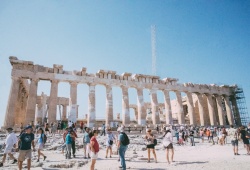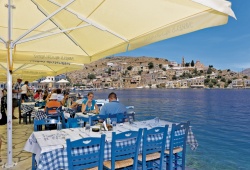What Types of Tourism are available in Greece?
Greece, with its rich history, stunning landscapes, and vibrant culture, has long been a popular destination for tourists from around the world. From ancient ruins to idyllic islands, this Mediterranean country offers a wide range of tourism experiences. Whether you are a history enthusiast, a nature lover, or simply seeking relaxation on pristine beaches, Greece has something to offer for everyone. In this article, we will explore the various types of tourism available in Greece, highlighting the unique attractions and experiences that make this country a must-visit destination.
1. Cultural Tourism
Greece is renowned for its ancient civilization and is often referred to as the cradle of Western civilization. The country is home to numerous archaeological sites and historical landmarks that attract millions of tourists each year. Athens, the capital city, is a treasure trove of ancient wonders, including the iconic Acropolis with its Parthenon temple. Delphi, Olympia, and Mycenae are other significant archaeological sites that offer a glimpse into Greece's glorious past.
Beyond the mainland, the Greek islands also boast a rich cultural heritage. Santorini, with its whitewashed buildings and blue-domed churches, is not only a picturesque destination but also home to the ancient city of Akrotiri. Crete, the largest Greek island, is known for its Minoan ruins and the legendary Palace of Knossos. Exploring these cultural sites allows visitors to immerse themselves in Greece's fascinating history and gain a deeper understanding of its contributions to art, philosophy, and democracy.
2. Nature Tourism
Greece's diverse landscapes provide ample opportunities for nature enthusiasts to indulge in outdoor activities and explore its natural wonders. The country is blessed with breathtaking mountains, lush forests, and crystal-clear waters. The Pindus Mountain Range offers excellent hiking trails, with Mount Olympus being the most famous, known as the mythical home of the Greek gods.
For those seeking coastal beauty, Greece's islands are a paradise. The Cyclades, including Mykonos and Naxos, are renowned for their pristine beaches and turquoise waters. Zakynthos, with its famous Navagio Beach and Blue Caves, is a popular destination for snorkeling and diving. The island of Corfu, with its lush greenery and stunning coastline, offers a perfect blend of nature and history.
3. Gastronomic Tourism
Greek cuisine is a delightful fusion of Mediterranean flavors, characterized by fresh ingredients, olive oil, herbs, and spices. Exploring Greece's culinary offerings is an essential part of any visit to the country. From traditional tavernas to gourmet restaurants, there is a wide range of dining options to satisfy every palate.
The Mediterranean diet, with its emphasis on vegetables, fruits, fish, and whole grains, is not only delicious but also considered one of the healthiest in the world. Greek dishes such as moussaka, souvlaki, and tzatziki have gained international recognition. Visitors can also indulge in local specialties like feta cheese, olives, and honey, which vary in taste depending on the region.
4. Adventure Tourism
For thrill-seekers and adrenaline junkies, Greece offers an array of adventure activities that cater to all levels of experience. The country's diverse landscapes provide a playground for outdoor enthusiasts. Water sports such as windsurfing, kiteboarding, and sailing are popular along the coastlines and on the islands.
The rugged terrain of Greece's mountains is perfect for hiking, rock climbing, and mountain biking. The Vikos Gorge in the Zagori region is one of the deepest gorges in the world and offers breathtaking views. Rafting and kayaking can be enjoyed in various rivers, including the Voidomatis River.
5. Religious Tourism
Greece's religious tourism encompasses a diverse range of faiths, including Greek Orthodox Christianity, ancient Greek mythology, and other religious practices. The country is home to countless sacred sites that hold immense historical and cultural significance. One of the most iconic destinations is Mount Athos, a monastic republic that has preserved its Orthodox Christian traditions for over a millennium. Accessible only to male visitors with special permits, Mount Athos offers a profound spiritual experience amidst its awe-inspiring monasteries and breathtaking natural beauty.
Moving from the mainland to the islands, the island of Patmos holds great importance for Christians as it is believed to be the place where Saint John the Apostle received the divine revelation, resulting in the writing of the Book of Revelation. The Monastery of Saint John the Theologian, perched atop a hill, is a major pilgrimage site attracting believers from around the world. The island of Tinos is another prominent destination, famous for its Church of Panagia Evangelistria, where miracles are said to have occurred. Every year, thousands of pilgrim’s flocks to Tinos to pay their respects and seek solace.
The city of Athens, with its ancient ruins and historical landmarks, also offers a wealth of religious sites. The Acropolis, crowned by the Parthenon, was once dedicated to Athena, the Greek goddess of wisdom and warfare. Exploring this iconic site allows visitors to delve into the ancient Greek religious practices and marvel at the architectural wonders of the past.
6. Cruise Tourism – Island Hopping in Greece
One of the best ways to explore this beautiful country is through cruise tourism, particularly through the popular activity of island hopping. Island hopping allows travelers to experience the diversity of Greece's islands, each with its own unique charm and attractions. From ancient ruins to pristine beaches, there is something for everyone on a Greek island-hopping cruise.
The Greek islands offer a plethora of experiences for travelers. From the iconic Santorini with its breathtaking sunsets and white-washed buildings, to the historical wonders of Crete and Rhodes, each island has its own distinct character. Island hopping allows tourists to visit multiple islands in one trip, providing a taste of the rich history, culture, and natural beauty that Greece has to offer. One of the advantages of island hopping by cruise ship is the convenience it offers. Travelers can unpack once and wake up in a new destination each day, without the hassle of packing and unpacking at each stop. Cruise ships also provide a range of onboard amenities and activities, ensuring that passengers have a comfortable and enjoyable journey between islands.
Island hopping in Greece is not just about visiting beautiful beaches and taking in stunning views. It is also an opportunity to immerse oneself in Greek culture. Each island has its own traditions, cuisine, and way of life, offering a unique experience for visitors. Exploring the narrow streets of Mykonos or wandering through the ancient ruins of Delos can transport travelers back in time. Sampling local delicacies such as moussaka or souvlaki is a must for food enthusiasts. Engaging with the friendly locals and experiencing traditional festivals and celebrations can provide an authentic glimpse into Greek life.
Conclusion
Greece is a country that offers a wide range of tourism experiences, catering to the interests and preferences of different travelers. Whether you are fascinated by ancient history, captivated by natural beauty, intrigued by culinary delights, or seeking adventure, Greece has it all. From exploring archaeological sites to basking in the sun on pristine beaches, this Mediterranean gem promises an unforgettable journey. So, pack your bags and embark on a Greek adventure that will leave you with memories to last a lifetime.

















